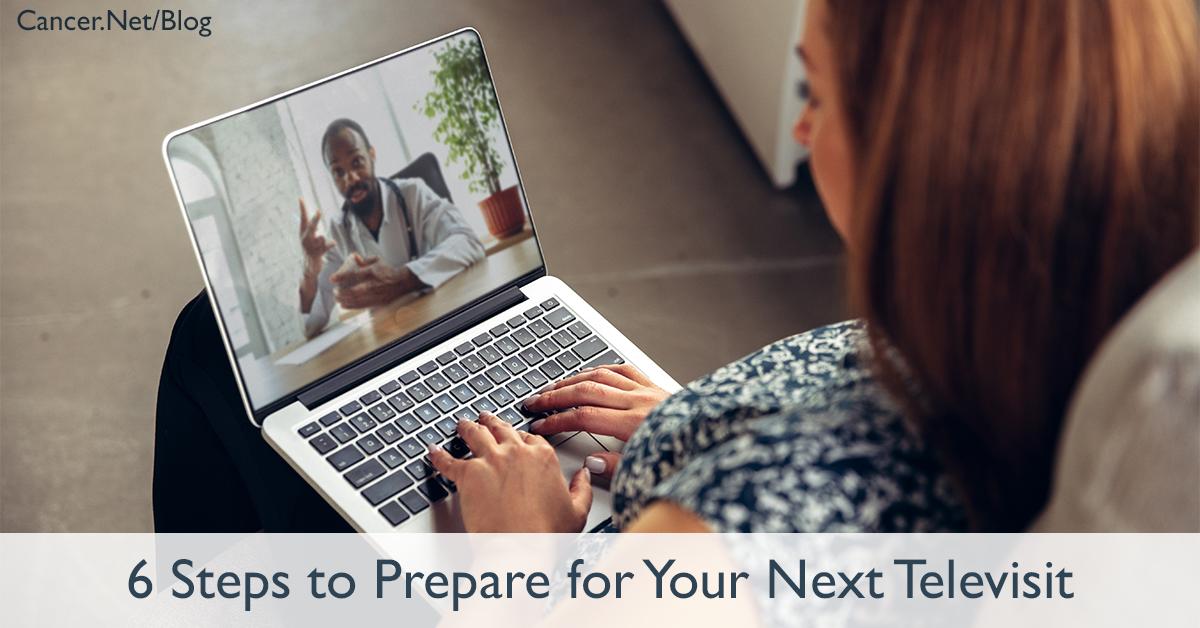
Carolyn B. Hendricks, MD, FASCO, is a breast-dedicated medical oncologist in community practice in Bethesda, Maryland. She did all of her medical training at Johns Hopkins University. She is a member of the Breast Program at Suburban Hospital Johns Hopkins Medicine. She is also an active American Society of Clinical Oncology (ASCO) volunteer, primarily in the areas of quality of care, mentoring and leadership development, government relations, and advocacy. Her non-breast cancer-related passions are living sustainably off the grid, birdwatching, cycling, and conservation of air, land, and water in Western Pennsylvania. View Dr. Hendricks’ full disclosures. You can also follow her on Twitter.
The COVID-19 pandemic has affected every aspect of cancer care, including a wide shift to televisits in place of in-person appointments. Televisits, also called telemedicine or telehealth, allow doctors and their patients to meet over the phone or through video chat. Televisits are helpful for people with cancer and their doctors during the COVID-19 pandemic because they help lower the risk of contracting the virus. As a result of the pandemic, the majority of cancer doctors now offer televisits to their patients using different platforms over either a smartphone or a computer.
For most people with cancer, televisits may be new. These virtual visits are now being scheduled for many types of cancer care appointments, including the first consultation, visits to monitor cancer treatment and treatment-related side effects, visits to discuss results of lab tests and scans, visits to tackle new problems, and visits for long-term follow-up survivorship care. Any cancer visit that doesn’t require hands-on care can be accomplished by televisit.
Aside from helping prevent the spread of COVID-19, televisits also provide several other benefits to people with cancer and their families, including:
-
Improving access to quality cancer care. Due to the pandemic, many people with cancer and those in the general public have delayed visits for cancer screenings and reporting of symptoms that might lead to a cancer diagnosis. A televisit can provide an opportunity for timely reminders about the importance of cancer screening and reinforce recommendations for other recommended visits, lab work, and scans that might have otherwise been delayed.
-
Higher satisfaction. Patient satisfaction surveys about televisits show that patients are more satisfied with televisits than with other types of visits. This high level of satisfaction centers on the convenience of smartphone and online visits, as well as timely access to their doctors.
-
Maintaining your safety. If you are receiving cancer treatment that is suppressing your immune system, a televisit allows you to be seen by your doctor without increasing your risk of infection. And, the pandemic has caused a lot of distress and anxiety for people with cancer, and this type of visit allows you to report your symptoms and get support in the safety of your own home.
If you and your doctor decide that a televisit is right for you, here are some important steps you can take to make the most of your visit.
1. Make sure you have the right technology ahead of time.
Before your visit, make certain that you have the correct equipment and details about how to meet with your doctor. If you are using your phone, make sure you have the correct phone number, date, and time to call in. If you are using a video connection, make sure you have the necessary software on your device (for example, Zoom or FaceTime applications) and a good internet connection.
2. Take advantage of resources your doctor’s office may offer.
Since the beginning of the COVID-19 pandemic, medical practices have quickly adopted new systems for phone and video visits and can provide you with information and support before your visit. In many practices, a member of the doctor’s staff will contact you before the visit to gather updated medical information and to help your televisit go smoothly. Don’t hesitate to ask for help before or during your visit, including questions about technology.
3. Address any privacy concerns.
Doctors have taken steps to ensure that your medical privacy and confidentiality are maintained at the same level during televisits as they are during in-person visits. If you have questions about the privacy and confidentiality of televisits, take time to address them with the practice before your visit.
4. Check that your televisit will be covered by insurance.
In the face of the COVID-19 pandemic, insurance companies have adjusted to the shift to televisits by providing special billing codes for these visits. Before your visit, contact your insurance company to make certain that your visit will be covered, so you can avoid any surprise bills.
5. Include family and friends on your televisit.
Your doctor is coming to you through your phone or computer. If possible, feel free to have a family member or friend participate in your visit, including from their own home or office. They can provide another set of eyes and ears for you to communicate with your doctor during the visit. Many cancer doctors who offer televisits enjoy seeing and interacting with their patients and families in their own homes instead of the office. If you live far away from your doctor’s office, or if your doctor lives far away from their office, a televisit can bring you both together and save time spent traveling and commuting.
6. Know how much time you will have with the doctor during your televisit.
Make sure you know how much time has been set aside for your visit so you can make the most of it. Ideally, your visit should be scheduled when you can call or dial in without any distractions or interruptions. Before the end of the visit, make certain you receive any orders for lab work or tests that need to be performed. Ask when your next visit will be and whether it will be a televisit or an in-person visit. Finally, be sure you know how to reach your doctor if any problems arise between visits.
Televisits are likely here to stay. With the uncertainty surrounding the length of the pandemic, doctors are preparing to continue offering televisits to their patients for a long time. It makes sense to prepare for these visits and to make the most of them. If you have suggestions on how your doctor’s office can help tailor your visit for you, let them know. Televisits have increased to help meet the challenges of the COVID-19 pandemic. Your doctor wants to ensure televisits work for you so you receive high-quality cancer care both during and after the pandemic.







